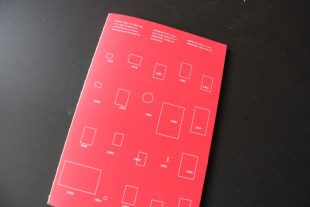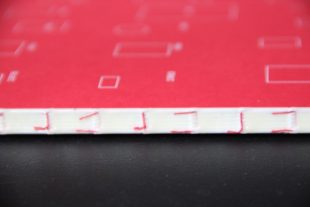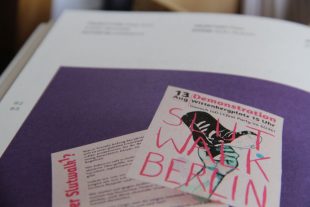Glasgow Women’s Library recently received a neat parcel coming straight from Berlin. We opened the packaging with anticipation and were delighted to find a book and a letter sent to us by our friend Friederike Mehl. She sent us a copy of the book Wir haben sie noch alle! Perspektiven auf Feminismus, Frauenbewegung und Geschichte which was very recently published by the FFBIZ – Das feministische Archiv e.V. (the Women’s Research, Education and Information Centre – The Feminist Archive Inc.) in celebration of their 40th birthday. Since the book is written in German and I am able to translate, Adele kindly asked me to write down a review of it myself, which I will gladly do in the following.

The title in German is a pun here and roughly translates to We’ve Still Got It All Together! Perspectives on Feminism, Women’s Movement and History but this honestly does not do its multiple layers of intended meaning justice. Some of the layers are deconstructed in the introduction but it was easy to construe even more yet suitable meanings. First of all, “wir haben sie noch alle” is a colloquial phrase used to say that “we are not mad yet”. On the one hand, this can be understood in the sense that feminists have often been shunned as madwomen by the patriarchy. On the other hand, it relates the stages of production of this book: The team only had very few months to find authors, compose the texts, configure the layout, and send the yet digital opus in its entirety to printers. Within less than six months, they achieved this besides running the FFBIZ. Truly impressive!
Besides the colloquial meaning, the title can also be read as “we are still in ownership of everything”. Of course, this alludes to the status of the FFBIZ as an archive. Even more so, the FFBIZ is currently holder of the largest archival collection on the history of women and gender in Germany. However, the authors also refer to the thought processes behind their collection and the reflection thereof. Do they really cover every feminist discussion or topic that was or has been of importance to German women? Do they also do so in the book? Although the authors assert that this book cannot give an answer to this, in my opinion they surely cover an array of debates – but more on this later on!

I was exhilarated to find a mention of Glasgow Women’s Library in the introduction. The FFBIZ notes that our publication 21 Revolutions in 2014, explaining and honouring some of our favourite pieces from our exhibitions and archive collections, was the starting and also inspirational point for Wir haben sie noch alle!, which is really an honour for us. Personally, I have not worked together with the FFBIZ yet, but reading the introduction drew me to many parallels with the spirit of GWL. The authors stress how they gave all their contributors a free choice about how they would contribute to the publication in terms of items to be presented and how they would be presented. Also, they collaborated with a local design student named Judith Fehlau for her final project. Judith Fehlau did an amazing job at designing this piece. Besides the striking red cover with its geometric shapes and numbers, it was the spine that immediately caught my eye. The pages are bound together with a thick layer of transparent glue and small pieces of red thread are let into it. I have never seen such a design before!
The book depicts 40 objects from the collection presented by 40 different authors in highly individually stylised pieces of writing. These are arranged according to the timeline of the FFBIZ reaching from the very beginnings in 1978 into 2018 and beyond. The texts range from poetry to loosely scientific descriptions and the choice of objects is well-balanced.
The objects depicted are remarkably versatile and too different in character to be named individually. Books, leaflets calling for participators in protests, postcards, a lighter, a cactus, reports from the German Federal Government or from NGOs, a flash drive, … and the list goes on and on and on. The collection presented truly captures what has been moving Germany and its women since the 1970s (and beyond). There are, for example, objects from the highly active anti-fascist organizations, from the Jewish community, the LGBT community, a zine for Afro-German and black women and an object referring to the #aufschrei debate (which is closely related to the #metoo debate but occurred a few years before it).

I must admit that a leaflet for the 2011 Berlin Slut Walk is my favourite object in the book. The so-called ‘slut walks’ took place in many different countries worldwide after ongoing debates on sexualised violence and media reports in the style of the widely shared assumption a woman would ‘ask for it’ by the way she dresses clashed. The walks received wide media coverage and it was the first time feminism sparked my interest. Almost every girl from my generation remembers growing up as a constant game of check and blame in the fashion department. Before you would leave the house for school or to hang out with your friends, your mother would discreetly pry on the way you dress. If she found it to be inappropriate (a.k.a. ‘too appealing for men’), she would tell you to cover up and not fear a fight. In instances where she would accompany you, e.g. to barbecues with friends of the family, your mother would incessantly keep an eye out for your clothes as well. Did your skirt slide up a bit too much when you sat down? Would your loosely-fitting t-shirt reveal a little bit too much of your yet non-existent cleavage? Oh, dear girl, prepare for the ultimate hissed blame in between snacks and laughter. Sometimes, mothers would even use the actual argument of: “It makes men crazy.”. I never understood how it could be my fault to this extent when these men were grown up people four times my age. At least. People you would expect self control from. For me, the slut walks symbolise a shift in thinking among my generation. Apart from the fact that I am experiencing less catcalling in my city than I used to a few years ago, I see many women my age fighting back without hesitation and being much less inhibited to dress the way they want. I am looking forward to this shift manifesting in society and putting the blame on the actual predators.
We are very delighted to welcome this surprise gift into our collection and thank Friederike Mehl and the FFBIZ for this fantastic contribution to research on and conservation of women’s history. It is truly a pleasure to browse the pages of this book and discover the objects, some of which come quite unexpected in such a collection. Not to forget the creative and electrifying texts that go with them! The book is on display in our ‘New In’ shelf right opposite of Front of House and can be borrowed as of now. Moreover, we are welcoming this highly recent publication into our growing collection of texts in languages other than English, which we have been aiming for this year.
Jeanette is an intern at Glasgow Women’s Library and involved in the National Lifelong Learning Project and Story Café, among other projects of GWL. She started in April and will stay until early October. Her internship here is part of her studies of English and Gender Studies at the Saarland University in Germany, where she grew up.

Comments are closed.